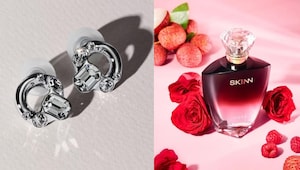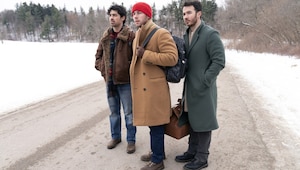
Navigating the friendship conundrum, can you date a friend’s ex?
It's a grey area, but should you ever break 'the code'?

Few things are considered truly sacrosanct in friendships: never reveal their darkest secrets, never bring a partner to a girl’s night, never pull an embarrassing story out of the archives in public—and, for most people—never date their ex. As the world gets flatter every day with more dating apps that can fit on your phone’s home screen, there seems less justification than ever for going out with a friend’s former partner. This isn’t the ’90s, where we are forced to function on a 5 km social radius. We have limitless potential dates just a swipe away, a Friday night paramour conjured up in minutes, a ‘looking to look it down’ waiting in the wings on Hinge. How then, in a scenario where you can date beyond any border, can dating a friend’s ex be kosher?
When I bring it up at parties, the answer splits the room. For some, like Ria*(27), it can never be okay; and she speaks from being on the business end of it. When her college roommate started dating her ex-boyfriend of four years, the owl that delivered the letter was an Instagram story. “It wasn’t just the betrayal of it that was bad enough. It was that she knew how much I loved him and how wrecked I was by the break-up. She didn’t even have the decency to talk to me about it.” Ria, who had stayed friends with her ex, promptly severed contact with both; and has no desire to fix either equation. “I introduced them at my birthday party! Of all the people they could’ve been with, I don’t understand why they had to choose each other.”
What’s interesting about Ria’s last statement is that it links back to the notion of ‘infinite choice’. This is ‘the code’, the idea of ‘bros before hoes’ (sorry, but no other phrase hits home like this monstrosity). It runs strong in millennials and Gen Z alike, with women prizing their female friendships exactly as much as romantic partnerships. Research by an Australian women’s community, Connected Women, and a study by the University of California back up this fact with data. The former reveals that 81 per cent of adult women think their friendships are as equally important to them as their romantic partnerships.

The invocation of ‘the code’ starts as young as pre-teenage. “Adolescents are about 75 per cent less likely to date someone if that person dated their friend in the past,” says Cassie McMillan, assistant professor and researcher in Northeastern University’s Network Science Institute. McMillan co-authored a study about the increase in STIs in adolescents who dated strangers to avoid overlap that was published in the journal Social Networks**. The sisterhood starts—and stays–strong; strong enough to counter the very thought of fighting over a love interest when there are endless possibilities.
But a 2019 study, titled A Rejection Mind-Set: Choice Overload in Online Dating** by Tila Pronk of Tilburg University, makes an interesting counter-argument. It confirms what we have noodled around with, but never articulated—that being spoilt for choice can actually spoil it all. The study hypothesised the ‘rejection mindset’, where unlimited access to multiple partners made people more pessimistic about them. “Across three studies, participants immediately started to reject more hypothetical and actual partners when dating online, cumulating on average a decrease of 27 per cent in chance of acceptance from the first to the last partner option.” The pictures on profiles stopped being satisfying, and so did the dating experience.
It was this experience exactly that led Farah* to her current boyfriend—who also happens to be her work friend’s ex. “We’d met a couple of times at a work event and I really liked him!” says Farah. “But, of course, he was dating my friend, so he was immediately off-limits. But, about two years after I had quit that job, I saw him on Tinder. I screenshotted his profile and sent it to my friend, instinctively assuming he was cheating. She replied saying they had split up a year ago. A few months later, I saw him again on Hinge, and this time, I swiped right.” Something still didn’t sit well with Farah, though, and so she reached out to let her friend know. “She gave me her blessing—maybe not enthusiastically, but tentatively—and said if I really liked him, I should go for it.” Two years later, they’re going strong—and her friend is happily married to someone else.
In Asha’s* case, she actually set up her ex-girlfriend with one of her friends. “This girl and I met at a friend’s dinner, and became fast friends. Over the course of the year, as we became closer, I realised she was actually perfect for my ex.” Asha and her ex-girlfriend have stayed incredibly close friends, even seven years after breaking up. “My ex and I work better as friends,” she smiles, and says that she “feels no jealousy at all”. “I’m secure in our friendship—and there is no future for us. So there’s nothing to be jealous about!”

The desire to date a friend’s ex isn’t unnecessarily sadomasochistic. It comes from a far simpler place—craving familiarity. “We covet what we see every day,” an apt quote, ironically, from one of the most terrifying characters in fiction—Hannibal Lecter. The Mere-Exposure Effect, a psychological phenomenon by which people tend to develop liking things because they are familiar with them (also called the familiarity principle), is proof of that. In a world of strangers that are complete wild cards, a known potential partner—even one with a complicated history—can present as a better option because there is a sense of familiarity, which in this case breeds comfort and not contempt.
It answers the question of why—with all that choice and all that freedom—a person might still come back like a homing pigeon to a complicated familiarity. It explains why someone would choose to tread the tricky path of dating a friend’s ex. Whether you can, or should, is too layered, in my opinion, to whittle down to ‘yes’ or ‘no’. While there are some dos and don’ts (see my 101), the overarching answer to this question is like a fantastically tailored suit: it’s bespoke and comes at a price.
How to date a friend's ex 101
Gauge both relationships: How close are you and your friend? How long were they with their partner? Did the relationship end badly? Can that baggage affect you? Weigh the elements carefully before progressing.
Don’t ask permission: Yes, it is important your friend hears it from you. But while they’re allowed to express discomfort, no one has the right to tell you who to date. Factoring in their opinion is your decision.
Be willing to lose the friend: Even if you do everything right, your friendship might not survive it—especially if you and their ex do. Be prepared to take that risk.
Never compare: It will be tempting to draw comparisons. Your partner doing it is an instant no-no (exit, stat!), but you shouldn’t either. These are two different relationships—and the first didn’t work for a reason. Don’t get stuck in the past instead of focusing on the future.
*All names have been changed to ensure anonymity.
Author and editor Saumyaa Vohra’s Match Point is a column that explores the ever-evolving dynamics of young love. Vohra is the author of the novel One Night Only, published by Pan Macmillan India.
This piece originally appeared in Cosmopolitan India, January-February 2024, print issue.
Image credit: Pexels
Also Read: Should you have your ex on social media?
Also Read: If you could, would you erase memories of your ex?
more from Relationships

Is 'future faking' the new gaslighting? Decoding this new dating trend

Bad at gifting? Check out these stocking stuffer ideas based on each zodiac sign

15 new Christmas movies you might want to add to your 2025 holiday watch list

Why glycolic acid is your skin's best friend for the winter season

How training for a marathon became the most honest conversation I have ever had with myself

Emily in Paris season 5 is back—and we’re still hate-watching every minute of it

Women have long been having sex on the first date—so why do some of us still feel shamed?

The 'shixie' is a modern take on the 70s shag haircut: 10 style ideas and how to wear the trending look

These are the most Googled dating and relationships questions of 2025—and, er, it’s been an anxious year

Why blush balms are the low-effort glow stick for fuss-free radiance
